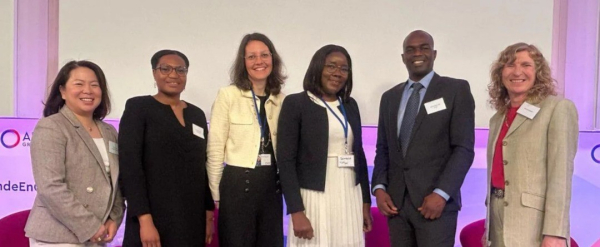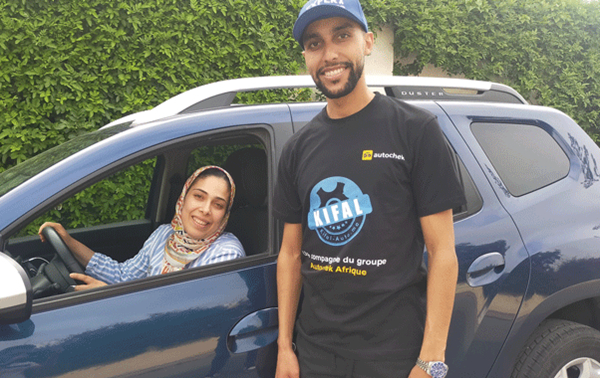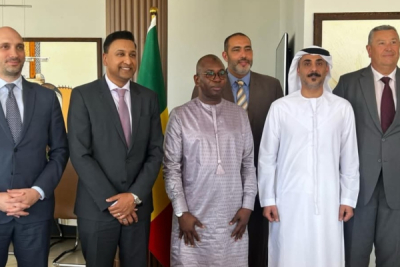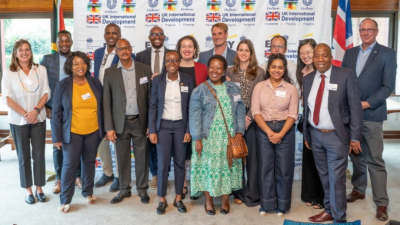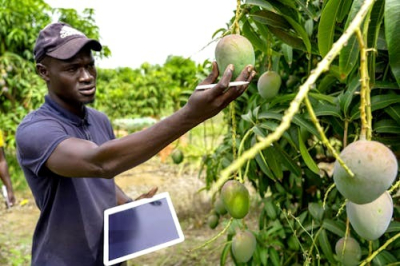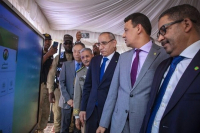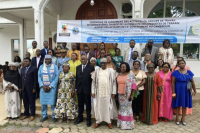The commitment is significant because it addresses one of Africa’s most persistent challenges: lack of access to affordable and inclusive financial services.
The Agence française de développement (AFD), which advances France’s policy on sustainable investment and international solidarity, has announced an additional €3 million commitment to the Africa Digital Financial Inclusion Facility (ADFI). The move, announced on April 9, aims to accelerate access to financial services for underserved populations across the continent. This brings AFD’s total contribution to ADFI to over €5 million.
“Developing digital financial services is a key pathway to reach financially excluded populations in Africa,” said Audrey Brule-Françoise, Head of AFD’s Financial Systems Division. “This new contribution will help scale up impactful and inclusive solutions.”
The fresh injection of funds will support scalable digital financial solutions that enable access to credit, savings, and other services essential for investment and entrepreneurship—particularly among women, youth, small businesses, and rural communities.
ADFI, managed by the African Development Bank (AfDB), was launched in 2019 as a collaborative effort between AfDB, AFD, the Bill & Melinda Gates Foundation, and the Government of Luxembourg. France’s Ministry for the Economy, Finance and Industrial and Digital Sovereignty, the Women’s Enterprise Finance Initiative (We-Fi), and India’s Ministry of Finance later joined as partners, further strengthening the initiative’s global backing.
Despite progress in mobile money and fintech innovation, close to half of Africa’s adult population remains excluded from digital financial services. World Bank data shows that in Sub-Saharan Africa, account ownership has more than doubled since 2011, reaching 49 percent in 2021-22. Yet, disparities remain stark—ranging from just 6 percent in South Sudan to 91 percent in Mauritius—highlighting the vast potential to expand financial inclusion through the digitalization of payments.
ADFI aims to bridge this gap through investments in digital infrastructure, supportive regulation, and product innovation, with a strong focus on gender inclusion and capacity building.
With over 2,700 projects in 115 countries, AFD continues to play a central role in supporting sustainable development and financial inclusion, reinforcing France’s global commitment to the Sustainable Development Goals.
Hikmatu Bilali
With its stated aim being to streamline Morocco's used car market, the startup is rebuilding the buying and selling process with reliable services tailored to individuals and professionals.
Kifal Auto, a Moroccan startup's e-commerce platform, facilitates the online purchase, sale, and rental of used cars across multiple cities in the country. Founded in 2019 by Nizar Abdallaoui Maane and based in Casablanca, the company was acquired in 2022 by Autochek, a Nigeria-based automotive technology firm expanding into North Africa.
The platform offers comprehensive client support, including mechanical inspections, vehicle valuations, and administrative procedure management. Vehicles undergo a stringent 200-point expert inspection, ensuring they are in sound condition. Users, whether buying or selling, have access to all necessary data to secure favorable transactions.
Kifal Auto operates in numerous Moroccan cities, including Casablanca, Fez, Rabat, Tangier, Agadir, and Marrakech. The platform features a broad selection of car brands, spanning Japanese, German, and American models.
Additionally, the startup provides car rental services, allowing customers to select new vehicles and benefit from flexible contracts ranging from 12 to 60 months, with fixed monthly payments covering all services for streamlined driving.
Kifal also offers financing solutions through partnerships with financial institutions, enabling buyers to make affordable monthly payments. Users can thus purchase vehicles on credit or leverage various financing options.
By Adoni Conrad Quenum,
Editing by Feriol Bewa
Senegal, with backing from the United Arab Emirates, plans to digitize its daaras, the traditional Quranic schools that educate thousands of children nationwide. A meeting held in Dakar on Monday, April 7, between Senegal’s Minister of National Education, Moustapha Mamba Guirassy, and a delegation from Abu Dhabi-based digital education firm Alef Education, advanced this initiative.
"Fruitful discussions laid the groundwork for a strong partnership, with a pilot phase set to begin in October 2025. The objective is clear: to build a digital education model rooted in our cultural and spiritual values, and capable of equipping daaras with 21st-century teaching tools," the Ministry of National Education said in a press release.
This initiative follows President Bassirou Diomaye Faye’s visit to Alef Education’s headquarters in the United Arab Emirates, where he established the foundation for the collaboration. It falls under the government’s "Senegal Daara Digital Transformation" project, which in its initial phase aims to deploy an artificial intelligence-powered personalized learning platform targeting over 10,000 students. The curriculum will include Arabic, mathematics, and Islamic studies.
Daaras are an important component of Senegal’s education system. According to a 2018 survey by the NGO Global Solidarity Initiative (GSI), there are more than 2,000 such schools across the country. This partnership is expected to create new educational opportunities. Alef Education, known for its expertise in educational technologies, is poised to play a central role in this transformation, providing students with modern digital tools while respecting the cultural and spiritual distinctiveness of the daaras.
By Samira Njoya,
Editing by Sèna D. B. de Sodji
Unilever South Africa, the British High Commission, and global professional services organization EY have awarded over R9 million ($455,832.39) in funding to four South African startups tackling plastic waste.
The support, announced by Unilever South Africa on April 7, includes tailored mentorship and business development assistance under the Transform South Africa initiative, which promotes sustainable solutions and community development.
This new cohort joins previous Transform-supported ventures like Oxfam South Africa’s Social Factory, Imagineif, and Loowatt. Together, they form part of a global movement across 17 countries, bringing scalable, inclusive solutions to millions.
Without a centralized system, fraudulent or inactive cooperatives could continue to receive support or partner with banks and donors. A digital registry increases accountability, ensures only verified cooperatives access benefits, and minimizes data manipulation or errors.
The Government of South Sudan, in partnership with the Food and Agriculture Organisation of the United Nations, launched, on Tuesday, April 8, a cooperative e-registry, a digital platform designed to streamline the registration and oversight of cooperatives across the country. The platform aims to enhance transparency, improve data management, and foster better coordination between agricultural cooperatives and government bodies.
At the launch event, Minister of Agriculture and Food Security Hussein Abdelbagi Akol described the initiative as a major shift from manual processes to a more efficient digital system. “The electronic registration is an innovation in the registration of cooperatives to foster, preserve information on cooperatives, and to know the status of the cooperatives at a glance and ensure stronger communication,” he said. He also emphasized the need for individuals to come together in groups to qualify for government support, signaling a push for more structured and organized cooperative efforts.
The platform is expected to enhance nationwide coordination of cooperatives, support youth engagement, and serve as a foundation for more data-driven agricultural development in South Sudan.
Food and Agriculture Organization (FAO) Country Representative Meshak Malo called on young people to embrace the platform and view agriculture as a modern, tech-enabled business opportunity.
For years, cooperatives in South Sudan have operated in a largely informal and fragmented system. There has been no central, reliable database to verify their existence, activities, or impact, Stephen Almadi, Head of the Cooperative Department at the Co-operative Bank of South Sudan noted. This led to duplicate efforts, inconsistent data, and limited coordination among stakeholders.
South Sudan has approximately 33 million acres of fertile arable land, yet only 4% is currently under cultivation, according to the Ministry of Agriculture and Food Security. This minimal usage highlights an urgent need for financial services to help farmers expand production. A centralized registry will help formalize and connect these farmers to financial institutions like Co-operative Bank, expanding access to credit and savings tools.
Hikmatu Bilali
- Platform offers details on academic programs, admission, application tracking, and student life
- Includes resources for embassies, cooperation bodies, and enrolled foreign students
Algeria's Minister of Higher Education and Scientific Research, Kamel Baddari, officially launched the "Study in Algeria" digital platform on Tuesday, April 8, in Algiers. Designed for international students looking to pursue their studies in Algeria, the platform is part of a broader effort to modernize the university system and boost its international appeal.
"Today, we are entering a new phase in the modernization of higher education and its opening to the world," said Baddari. "Algeria is increasingly seen as an attractive destination for international students, thanks to the global outreach we’ve initiated and the reforms undertaken to modernize our education system and improve its quality."
The platform offers a comprehensive overview of academic programs across Algeria, details on admission requirements, an online application portal, and real-time tracking of applications. It also includes practical guidance on administrative procedures, living conditions, and profiles of universities and research centers. Dedicated sections are available for embassies, cooperation services, and international students already enrolled in Algerian institutions.
This initiative follows the presidential decree issued in February, which lays out the framework for admitting foreign students to Algerian institutions, and forms part of the Higher Education Ministry’s five-year action plan (2024–2029). That roadmap prioritizes digital transformation and the expansion of academic cooperation at both regional and international levels.
The launch of "Study in Algeria" is a significant milestone in Algeria’s push to digitize higher education. The platform aims to enhance the country’s academic appeal, facilitate institutional exchanges, and position Algeria as a reputable study destination. By centralizing and streamlining access to university services, the initiative is expected to boost the global visibility of Algerian universities.
Samira Njoya
In just two years, this Tanzanian startup has rapidly established itself within the Fast Moving Consumer Goods (FMCG) sector. Now, leveraging its proprietary technology, the company is poised for regional expansion, fueled by a $1.5 million pre-seed funding round.
Sumet is an e-commerce solution developed by the Tanzanian startup Sumet Technologies. With its business-to-business (B2B) platform, it aims to streamline the distribution of fast-moving consumer goods across African markets. Founded in 2022 by Hazem Afify, Abdallah Omar, and Mahmoud Tawfik, the young company recently closed a $1.5 million funding round to strengthen its logistics infrastructure, optimize its AI-powered recommendation engine, and expand into new East African markets.
“At Sumet, we’re tackling one of Africa’s biggest challenges—enabling new brands to enter and grow in the market. [...] This funding is vital for strengthening our tech stack, bridging distribution gaps, and creating a dynamic, cost-effective ecosystem that empowers brands to scale effectively,” said Hazem Afify.
Thanks to an integrated logistics network and its web platform, retailers can order products from major brands in just a few clicks, with guaranteed delivery in under 24 hours in certain urban areas. For manufacturers, Sumet’s solution offers real-time sales tracking, better inventory planning, and increased visibility over final distribution points.
“Traditional distribution models often struggle to reach the fragmented and informal retail landscape. [...] We saw an opportunity to leverage technology to streamline the process, reduce costs, and create value for all stakeholders,” Hazem Afify added.
Sumet claims over 10,000 active retailers and processes more than 100,000 orders per month. This success is built on investment in data and automation, as well as a strong local deployment strategy, with teams on the ground in several regions of Tanzania. The startup plans to expand into Kenya, Uganda, and Rwanda.
By Adoni Conrad Quenum,
Editing by Feriol Bewa
- Mauritania launches digitized road traffic management system via “Khadamaty” app
- System enables online tracking of violations, fine payments, and complaint submissions
- Initiative aims to reduce bureaucracy, prevent injustices, and streamline citizen access to services
Mauritania launched a digitized road traffic management system on Monday, integrating it into the government's "Khadamaty" application. The system, overseen by the Interior Minister and his counterparts from the Ministries of Digital Transformation and Transport, aims to streamline traffic violation tracking, fine payments, and complaint submissions.
According to the Minister of Digital Transformation and Administrative Modernization, the system aims to reduce administrative burdens, eliminate unfair practices, and enhance citizen convenience. Users will be able to easily view vehicle offenses and pay fines online, eliminating lengthy delays and vehicle immobilization.
Developed through a collaboration between the General Directorate of National Security and the Ministry of Digital Transformation, the system aligns with President Mohamed Ould Cheikh El Ghazouani's "My Ambition for the Nation" initiative. This initiative prioritizes a modern, transparent, and citizen-centric administration driven by digital technologies. The recent launch of online criminal record payments exemplifies this approach.
This reform comes at a time when global indicators show that Mauritania lags significantly behind in e-government development. In 2024, the country ranked 165th in the United Nations E-Government Development Index with a score of 0.3491, significantly below the African average (0.4247) and global average (0.6382). Mauritania's online services score was notably low at 0.1688, lagging behind both African (0.3862) and global (0.5754) averages.
Beyond administrative efficiency, the system is expected to improve road safety by enhancing driver accountability and streamlining traffic management. An advanced digital platform, coupled with surveillance cameras, will bolster traffic control and promote greater road discipline.
By Samira Njoya
Editing by Sèna D. B. de Sodji
The Give1Project, in partnership with Concordia University and the United Nations Development Program (UNDP), has launched the second cohort of its Regional Cybersecurity Training Program to train 150 young people across West and Central Africa.
Participants will gain practical skills in cybersecurity and receive industry-recognized certification. They will also have access to mentorship, networking opportunities, and potential pathways to internships, employment, or entrepreneurship.
Applicants must be between 18 and 35 years old and be a citizen of one of the 24 countries in West and Central Africa. They must be currently enrolled in or have graduated from a university or technical institution.
The deadline for application is 17 April 2025.
- Cameroon has set up an interministerial working group on e-government to coordinate digital transition
- Group includes around 30 administrations and experts, led by the Ministry of Culture
- Tasks include conducting surveys, setting digital archiving standards, and ensuring system interoperability
Cameroon is advancing its multi-year program to digitize public archives, aiming to modernize document management and enhance information accessibility. To expedite this effort, an interministerial working group on e-government has been established to coordinate digitization across the public administration. The announcement came during a meeting held April 2 in Yaounde.
According to Minette Libom Li Likeng, Minister of Posts and Telecommunications, the initiative reflects "the government’s strong commitment to achieving a secure, structured, and strategic digital transition of public administration." She underscored the significance of digital archiving as a tool to bolster national data sovereignty and improve public service efficiency.
The newly formed interministerial working group on e-government comprises approximately 30 administrations and experts tasked with overseeing the national archives' digitization. Coordinated by the Ministry of Culture, the group will conduct field surveys, establish digital archiving guidelines, and structure an accessible and secure database. The group is also responsible for ensuring system interoperability and guaranteeing archive management adheres to international electronic governance standards.
This initiative is part of a broader reform effort to transform public administration, making it more responsive, transparent, and better equipped to serve citizens' needs. It aligns with efforts to optimize information management and enhance data security, critical components of good governance and national development.
The digital archiving of state records is projected to yield numerous benefits, including increased transparency within Cameroon's public administrations, reduced data loss risks, and streamlined citizen access to public information. Furthermore, effective archive management is expected to enhance the traceability of administrative decisions, reinforcing state accountability while lowering costs associated with physical archives.
By Samira Njoya,
Editing by Sèna D. B. de Sodji
More...
Afrisends, founded by Zeinabou Sidibé Koné, seeks to "open up the world" for African consumers by simplifying foreign currency payments, customs fees, and cross-border logistics.
Afrisends, a Malian e-logistics startup founded in 2021 by Zeinabou Sidibé Koné, is simplifying international shopping and delivery for African consumers and e-merchants, beginning in Mali. The platform addresses the challenge of limited access to global e-commerce platforms for African countries.
Operating without a mobile application, Afrisends connects Malian clients with "shoppers" located in Europe, the United States, and China. These shoppers purchase desired products from various e-commerce platforms and facilitate delivery through a network of logistics partners. Afrisends manages coordination, tracking, and delivery, typically within 10 days.
Users can also place orders themselves, then submit order confirmations and invoices to Afrisends, which will handle delivery to Bamako, Mali; Dakar, Senegal; or Abidjan, Côte d’Ivoire. Afrisends provides comprehensive support through its platform. To place an order, users log into their customer accounts, click "Add" or "Create an order" in the designated section, and follow the provided steps.
The model relies on a community-driven approach and complete process digitalization. Afrisends also offers business-to-business (B2B) solutions, particularly for Malian e-merchants seeking to export or source goods internationally.
Since its launch, Afrisends has attracted over 10,000 users and continues to expand by diversifying its services and extending its coverage areas. The startup aims to expand throughout the sub-region and become a key player in African cross-border e-commerce.
By Adoni Conrad Quenum,
Editing by Feriol Bewa
Artificial intelligence is rapidly reshaping sports worldwide, and in Africa, it offers significant potential to modernize the sector, improve performance, and drive economic growth, especially ahead of major continental sporting events.
Africa is poised to host a series of major sporting events, including the 2025 Africa Cup of Nations (AFCON) in Morocco, the 2026 Youth Olympic Games in Senegal, and the 2030 World Cup, co-hosted by Morocco. These events present significant opportunities for economic and technological advancement, beyond their sporting significance.
A March 2025 report by multinational management and technology consultancy BearingPoint, titled "Intelligence artificielle et sport en Afrique," highlights the growing role of AI in organizing and enhancing sports events across the continent. The report identifies AI as a tool for large-scale optimization, modernization, and value creation.
AI for Optimized Organization
BearingPoint's report indicates that AI can revolutionize sports event management in Africa by optimizing key areas. This includes logistical planning, crowd control, security, ticketing, and visitor flow forecasting. For athletes, AI enhances performance through game data analysis, injury prevention, personalized training programs, and fitness monitoring. Spectators benefit from personalized offerings, optimized content delivery, and improved accessibility solutions.
The integration of these technologies throughout event organization could stimulate local economies, optimize resource management, and enhance Africa’s international appeal.
Measurable Economic Impact
The economic impact of major sporting events is substantial. The 2010 World Cup in South Africa generated approximately 130,000 jobs and $385 million in revenue, while the 2019 AFCON in Egypt yielded $83 million. AI can maximize these returns by refining demand forecasts and optimizing service efficiency.
This trend aligns with global momentum. A Mordor Intelligence study projects the AI market in the sports industry to grow from $5.93 billion in 2024 to $20.94 billion by 2029, with an average annual growth rate of 28.69%. This growth reflects increasing interest in AI within the sports sector.
A dynamic SportsTech ecosystem is emerging in Africa, blending sports and innovation. In 2023, investments in this sector reached $5.3 million. AI is being utilized for talent identification, performance enhancement, injury prevention, and infrastructure management. This movement, driven by startups, incubators, and sports institutions, has the potential to drive sustainable growth.
Addressing Key Challenges
However, significant challenges remain. These include a lack of robust digital infrastructure, insufficient investment, a shortage of specialized skills, and the absence of a clear regulatory framework for personal data management. Stronger public-private sector collaboration is essential to overcome these obstacles. This includes implementing appropriate infrastructure, developing local skills, and establishing suitable regulatory policies.
By integrating AI throughout event preparation and organization, African sports events can become catalysts for digital transformation. AI is positioning itself as a strategic lever for modernization and enhancing the continent's attractiveness.
By Samira Njoya,
Editing by Sèna D. B. de Sodji
Global payment technology giant Mastercard announced on April 3 a partnership with Nomba, an African payment solutions provider. The collaboration aims to deliver faster, safer, and more seamless payment experiences for businesses across the country while advancing financial inclusion.
As part of the partnership, Mastercard’s trusted Gateway platform will be integrated into Nomba’s Checkout solution. This integration enables businesses to access a broader range of secure payment options, including international cards, QR codes, and other digital methods, thereby enhancing customer experience and boosting operational efficiency.
- Smart Africa alliance announces creation of African Artificial Intelligence Council
- Council to coordinate AI development across 40 African nations
- Focus areas include computing infrastructure, data governance, skills development, and industrial applications
Smart Africa, an alliance of 40 African nations driving the continent's digital agenda, announced the formation of the African Artificial Intelligence Council on April 3. The decision, made during the organization's 20th steering committee session in Kigali, seeks to structure AI development through governance frameworks and increased investment.
"In a historic decision, the steering committee approved the creation of the African Artificial Intelligence Council, a dedicated body to lead continental coordination on key AI pillars, including computing infrastructure, data management, skills development, industrial applications, and governance," the meeting's final communiqué stated.
The council will support African states by defining common AI frameworks, fostering public-private partnerships, and ensuring ethical and inclusive adoption. It will also accelerate digital infrastructure deployment and local talent training to maximize AI's economic and social benefits. AI has the potential to transform sectors such as agriculture, health, and education, where machine learning and data processing solutions are emerging.
This initiative aligns with African countries' efforts to leverage AI for growth. The Global System for Mobile Communications Association (GSMA) estimates AI could add $2.9 trillion to the continent's GDP by 2030, representing a 3% annual increase. However, AI development in Africa is hindered by coordination gaps, inadequate infrastructure, and nascent regulations.
The African AI Council aims to address these challenges by establishing a shared framework to attract investment and promote locally tailored solutions. It will also assist countries in tackling issues such as insufficient computing infrastructure, specialized skills shortages, and ethical considerations surrounding AI use.
By Samira Njoya,
Editing by Sèna D. B. de Sodji


